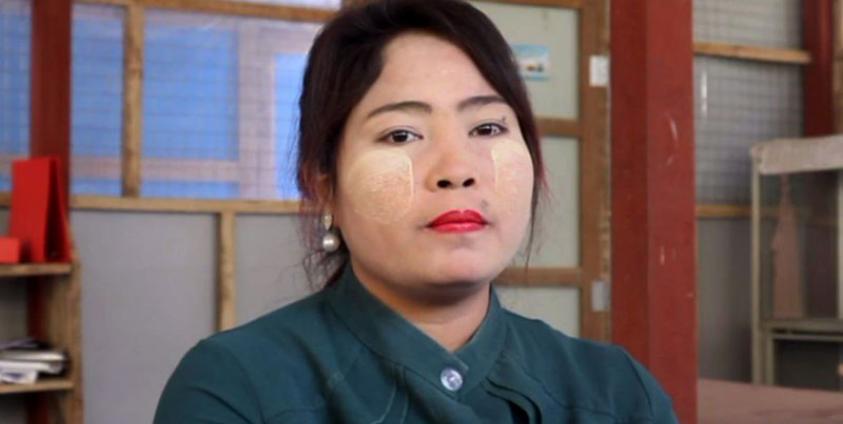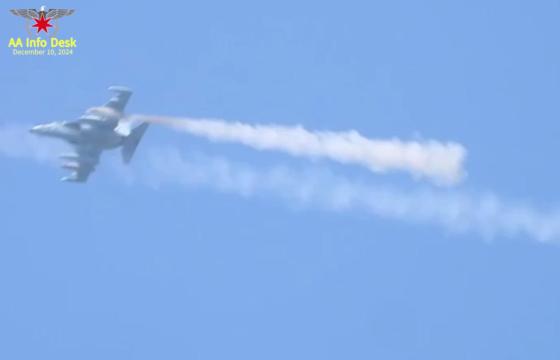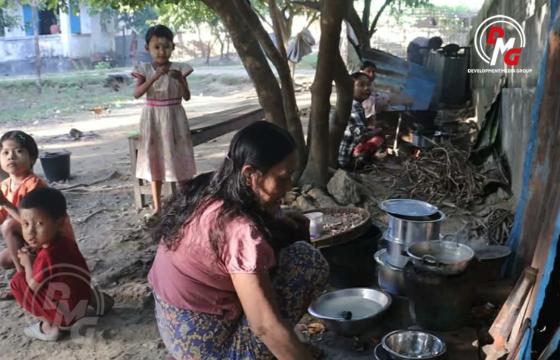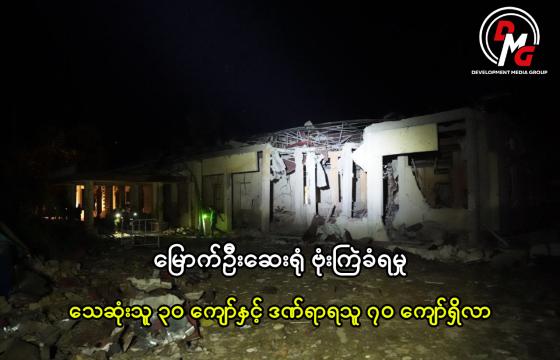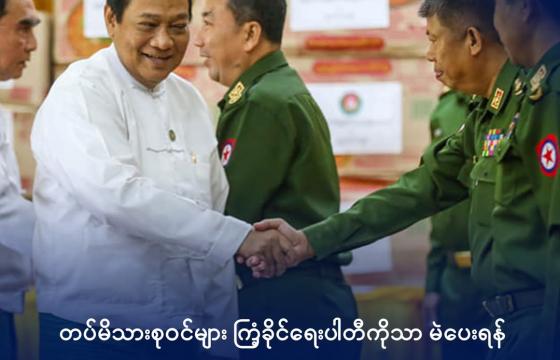The Arakan Army (AA) observed an informal ceasefire with the Myanmar military in late November on humanitarian grounds. The military regime has since begun forcing internally displaced people (IDPs) in Arakan State and Paletwa Township, Chin State, to return home, contending that they should do so because there is peace and stability in the region once again.
Most IDPs want to return to their homes, but the realities of their situations often do not allow it for the time being. DMG interviewed Ma Thel Thel Nu, manager of an IDP camp at Wibitza Wardi Monastery in Sittwe’s Mingan ward, who fled from Sein Hnyin Wa Village in Paletwa Township, about the current plight of IDPs and the challenges that will arise if they return home.
DMG: Please tell me about your arrival at the IDP camp and the difficulties you encountered on the way.
Ma Thel Thel Nu: Clashes broke out in my village and we fled to Sittwe as the military’s fighter jets launched attacks on the village. In the process of fleeing from the village, I experienced many losses and hardships. We didn’t have a place to take shelter, so we came to this IDP camp.
First, we fled to Samee town, where my 10-month-old baby died. My son died from excessive sweating and diarrhoea. We then moved to Kyauktaw from Samee town. We spent about one week travelling to Kyauktaw. We first arrived in Leikma Village in Kyauktaw Township, where junta soldiers checked our household certificates and ID cards. We then proceeded to Kyauktaw IDP camp to seek refuge, but we were told new IDPs were not being accepted. So we came to Sittwe and contacted the abbot of Wibitza Wardi Monastery. The abbot allowed us to stay at the displacement camp.
DMG: How do you earn a living for your family?
Ma Thel Thel Nu: IDP families receive a bit of support from the government and donor organisations. We are struggling to make ends meet. I go outside [the camp] to work if there are odd-jobs. When there is no work, I sell my jewellery to buy food and other necessary things.
DMG: Which organisations are currently supporting IDPs?
Ma Thel Thel Nu: We are provided with K21,000 each per month by WFP [World Food Programme] and household items by LWF [Lutheran World Relief]. CNI donates sanitary pads to IDP women and builds toilets. MAUA also builds makeshift tents for us, but their support is not enough for IDPs. We rely on relief supplies provided by the WFP and NGOs [nongovernmental organisations]. I would like to express gratitude for contributing to us.
DMG: The people who are taking refuge in the IDP camp are fleeing from which region, and what is their age range?
Ma Thel Thel Nu: There are 515 people from 93 households at the displacement camp and most of them are from Rathedaung, Minbya and Kyauktaw townships in Arakan State, and Paletwa Township in Chin State. Among the IDPs there are elderly people, but there are more children and more men and women.
DMG: Currently, there is an informal ceasefire between the military and the AA, so what is your attitude toward the return of the IDPs?
Ma Thel Thel Nu: We want to return home. Despite the latest ceasefire between the military and AA, we dare not return home for the time being. If the IDPs are to return home, the military council needs to be held accountable. The military council must also create job opportunities for IDPs and clear landmines.
We have no more homes as our homes were destroyed. Where should we stay? The village is already [overgrown] like a forest. We dare not go to the forest to cut down firewood. We will return home once the military clears landmines and ceases hostilities with the AA.
DMG: Has the military council said anything about the repatriation of IDPs?
Ma Thel Thel Nu: Officials from the township General Administration Department [GAD] summoned IDP camp managers regarding the return of IDPs. They told us that the GAD would provide K500,000 and rice to each IDP family if we return home. We were asked if we would otherwise take shelter at the displacement camp or stay at a place provided by the government. I replied that I would return to my village.
DMG: What difficulties do you think you will face if you return home?
Ma Thel Thel Nu: A lot of difficulties are waiting for us. Road transportation is not good and ferryboats cannot enter our village because the creek is shallow. Vehicles cannot pass on the land route due to the risk of landmines. Road transportation is bad, so how can our livelihoods be good? The government needs to repair our homes, which were abandoned for many years, and provide food supplies. Finally, even if the military council can’t give back all that we have lost, they will have to pay half of it.
DMG: What do you want to request in order to return home?
Ma Thel Thel Nu: What we want to ask is this: We want a guarantee that there will be no fighting at all. We will return home only if the military council gives a guarantee that there will be no fighting, because if there is another fight after we return home, where will we run? We have nowhere to run. These people fled because they didn’t want to die. We have heard of landmines injuring and killing [civilians] in the conflict areas. I don’t want that to happen.
DMG: What difficulties do women living in IDP camps face?
Ma Thel Thel Nu: IDP women are facing various hardships. For IDP women with husbands, their livelihoods are OK. IDP women without husbands struggle to make ends meet. It is not easy to get a job for IDP women in Sittwe. IDP women face many difficulties.
DMG: What else would you like to say?
Ma Thel Thel Nu: Even though the military council has asked the IDPs to return home, only they [IDPs] will know whether they should return or not. The side effects are varied and should be considered.
All IDPs here want to return home. No IDP wants to take shelter at a displacement camp. The military council should ensure homes for the return of IDPs. The military must clear the landmines for the safe return of IDPs. If the military gives us a guarantee that there will be no more fighting, we will return home.


